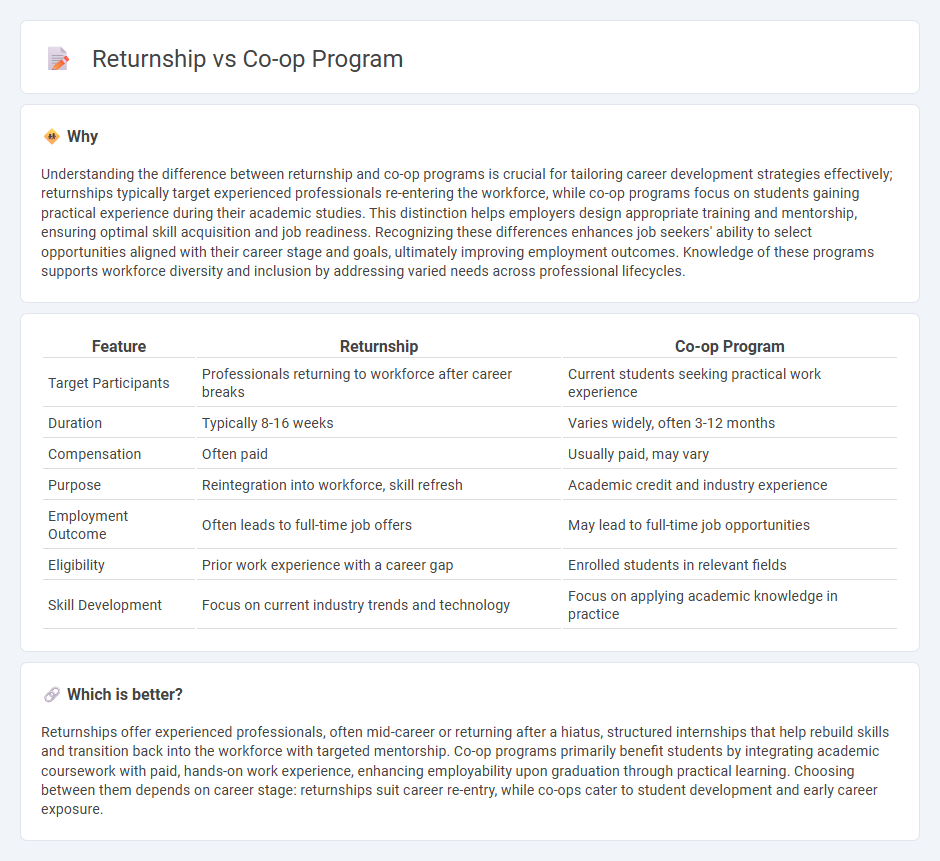
Returnship programs provide experienced professionals an opportunity to re-enter the workforce after a career break, focusing on skill refreshment and industry reintegration. Co-op programs mainly target students or recent graduates, offering structured work placements that combine academic learning with practical experience. Explore the benefits and differences of each to enhance your career path effectively.
Why it is important
Understanding the difference between returnship and co-op programs is crucial for tailoring career development strategies effectively; returnships typically target experienced professionals re-entering the workforce, while co-op programs focus on students gaining practical experience during their academic studies. This distinction helps employers design appropriate training and mentorship, ensuring optimal skill acquisition and job readiness. Recognizing these differences enhances job seekers' ability to select opportunities aligned with their career stage and goals, ultimately improving employment outcomes. Knowledge of these programs supports workforce diversity and inclusion by addressing varied needs across professional lifecycles.
Comparison Table
| Feature | Returnship | Co-op Program |
|---|---|---|
| Target Participants | Professionals returning to workforce after career breaks | Current students seeking practical work experience |
| Duration | Typically 8-16 weeks | Varies widely, often 3-12 months |
| Compensation | Often paid | Usually paid, may vary |
| Purpose | Reintegration into workforce, skill refresh | Academic credit and industry experience |
| Employment Outcome | Often leads to full-time job offers | May lead to full-time job opportunities |
| Eligibility | Prior work experience with a career gap | Enrolled students in relevant fields |
| Skill Development | Focus on current industry trends and technology | Focus on applying academic knowledge in practice |
Which is better?
Returnships offer experienced professionals, often mid-career or returning after a hiatus, structured internships that help rebuild skills and transition back into the workforce with targeted mentorship. Co-op programs primarily benefit students by integrating academic coursework with paid, hands-on work experience, enhancing employability upon graduation through practical learning. Choosing between them depends on career stage: returnships suit career re-entry, while co-ops cater to student development and early career exposure.
Connection
Returnship and co-op programs both provide structured opportunities for individuals to gain practical work experience and re-enter the workforce, often targeting different demographics such as career changers or students. These programs emphasize skill development, professional networking, and real-world application of knowledge, fostering smoother transitions into full-time employment. By bridging education or career gaps, they enhance employability and support workforce diversity and inclusion.
Key Terms
Paid Work Experience
Co-op programs offer structured paid work experience often integrated with academic curricula, providing students with real-world skills in their field of study. Returnships are designed to help professionals re-enter the workforce after a career gap, featuring paid internships that emphasize upskilling and industry reintegration. Explore the key differences and benefits of each to determine the best path for gaining valuable paid work experience.
Skill Development
Co-op programs integrate academic learning with practical work experience, enabling students to develop industry-specific skills over a semester or year, often with academic credit. Returnships target experienced professionals re-entering the workforce, emphasizing skill refreshment and upskilling to bridge gaps after career breaks. Discover how each can uniquely advance skill development on your career path.
Career Transition
Co-op programs offer structured, semester-long work experiences primarily designed for students seeking to gain industry skills while completing their education. Returnships target experienced professionals re-entering the workforce after a career break, providing tailored support to transition smoothly. Explore more about how each pathway can uniquely enhance your career transition strategy.
Source and External Links
Co-op - Texas A&M Career Center - A co-op program is a supervised, paid, career-related work experience that integrates semesters of academic study with paid full-time work terms, allowing students to gain practical knowledge and maintain full-time student status.
Co-Op Programs: Everything You Need to Know - Eddy - A co-op program involves a partnership between employer, university, and student to provide structured work relevant to academic study, typically designed with clear objectives and collaboration with university partners.
Cooperative education - Wikipedia - Cooperative education (co-op) combines classroom education with extended, paid work terms that alternate with academic semesters, offering students academic credit and valuable workforce experience.
 dowidth.com
dowidth.com